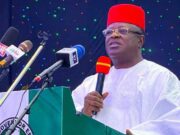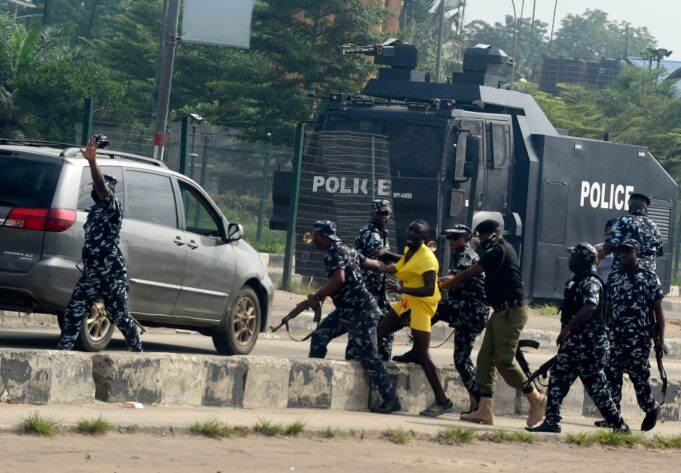A recent report by the Media Rights Agenda (MRA) has identified law enforcement and security agencies such as the police, military, and intelligence services as the principal aggressors against the media in Nigeria, with these groups accounting for the majority of journalist attacks in 2024.
The comprehensive 137-page report, titled “Media Freedom Under Threat: The State of Media Freedom and Journalists’ Safety in Nigeria 2024”, revealed that in 2022, security agencies were responsible for 29 out of 64 recorded attacks on journalists, representing nearly 45% of the total.
The situation worsened in 2023, when these agencies were involved in 34 out of 77 incidents, making up around 44% of the attacks.
However, 2024 has seen a notable escalation, with security agencies being implicated in 45 of the 69 attacks between January and October, which accounts for approximately 65% of all recorded incidents.
John Gbadamosi, MRA’s Programme Officer, expressed concern about this troubling trend, stating, “It is ironic that those entrusted with upholding the law and safeguarding citizens including journalists are now the primary agents of repression against the media. The widespread culture of impunity, which allows past offenders to act without fear of consequences, has emboldened these perpetrators to act with ever-increasing boldness.”
The report detailed 21 cases of assault, 17 arbitrary arrests, three raids on journalists’ offices or homes, eight death threats, six kidnappings, five instances of obstruction, one journalist killed, and several other forms of attacks.
Beyond security forces, the report also cited government officials (responsible for four attacks), the judiciary (two incidents), criminal elements (seven attacks), and unknown assailants (four attacks) as contributors to the growing hostility against journalists.
In a more positive note, Gbadamosi highlighted that 2024 saw a breakthrough in reducing the influence of the National Broadcasting Commission (NBC).
The NBC had previously imposed heavy fines on broadcasters for alleged violations of the Nigeria Broadcasting Code.
However, due to court rulings in May 2023 and January 2024, which prohibited these fines, the NBC refrained from imposing any penalties during the year.
Additionally, the report celebrated a significant development with the launch of a court-ordered investigation into the death of Pelumi Onifade, a journalist with Gboah TV who died after being arrested by police during the 2020 #EndSARS protests.
The investigation, which followed a wrongful death lawsuit initiated by the MRA, marks an important step towards accountability in attacks against journalists in Nigeria.
Gbadamosi stressed that unless the Nigerian government takes concrete steps to protect media freedom, the cycle of violence and impunity against journalists will continue to weaken the country’s democracy and the public’s right to information.
Meanwhile, security agencies also contributed to discussions on journalists’ safety.
Kabiru Mohammed Sani, Deputy Director of the Directorate of State Security (DSS) in Plateau State, advised journalists to prioritize security awareness during their work.
At a training workshop organized by the Nigeria Union of Journalists (NUJ) in Jos, Sani emphasized that journalists should remain cautious and vigilant, particularly when encountering unusual situations that could compromise their safety.
Similarly, Nelson Nanlap, another DSS official, urged journalists to avoid spreading information that could cause public panic or jeopardize security operations.
He emphasized the importance of adhering to journalistic ethics and ensuring that all information is properly verified before reporting.
In another part of the country, Delta State Governor Sheriff Oborevwori called on government spokespersons, media appointees, and social media influencers to actively counter misinformation and propaganda.
Speaking at the 5th Delta State Communication Workshop in Asaba, Governor Oborevwori highlighted the importance of effective communication in promoting the state’s achievements and advancing the administration’s goals.
He encouraged participants to enhance their skills and adapt to the evolving media landscape, especially in the digital era.
Oborevwori reiterated his administration’s commitment to supporting President Bola Ahmed Tinubu’s Renewed Hope Agenda, aiming to improve the lives of Nigerians, including those in Delta State.
He also stressed the role of media professionals in promoting peace, stability, and responsible governance.
The event featured discussions on media engagement and communication strategies, with trainers like Prof. Abigail Ogwezzy-Ndisika from the University of Lagos emphasizing the need for clear and impactful communication in governance.
In conclusion, the report from the Media Rights Agenda paints a concerning picture of the state of press freedom in Nigeria, with security agencies at the forefront of attacks against journalists.
Despite some positive developments, the persistence of impunity poses significant challenges to media safety and democracy in the country.

















